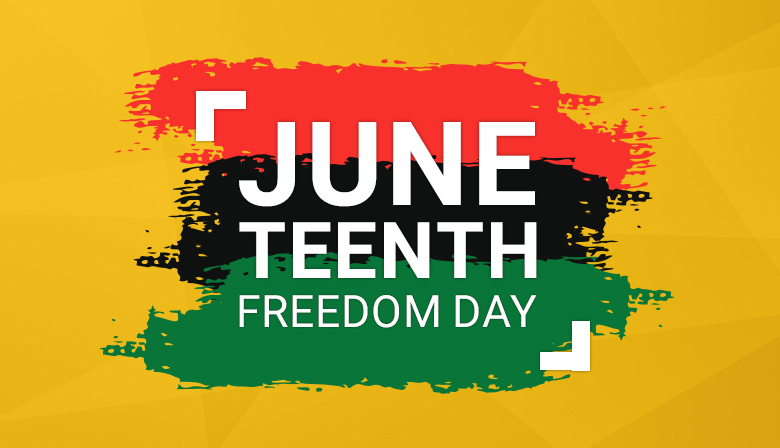
Today is “Juneteenth” or “Juneteenth Day.” Many may not understand the origin of the term, nor appreciate what it means in 2024. Here are a few words to explain the origin of the celebration, as I also offer a personal application of two of the spiritual concepts associated with this holiday.
Called Emancipation Day, Freedom Day, or Jubilee Day, Juneteenth goes back to June 19th, 1865, the date when the last slaves in America were freed. Although the rumors of freedom were widespread before this, actual emancipation did not come until General Gordon Granger rode into Galveston, Texas and issued General Order No. 3, on June 19th, almost two and a half years after President Abraham Lincoln signed the Emancipation Proclamation.
Annually, more than 200 cities in the United States sponsor week-long celebrations, culminating on June 19th, while others hold shorter celebrations. Juneteenth had previously been established as a state holiday in Texas in 1980, with several other states later declaring it a state holiday or day of observance. Legislation establishing Juneteenth as a federal holiday was passed by Congress on June 16, 2021, and signed into law by President Joe Biden the following day, exactly three years ago on June 17, my birthday.
Juneteenth Day symbolizes the end of slavery and the release of freedom for African Americans. An immediate association with the word “slavery” is the word ‘freedom.” Let me note that slavery has been a universal condition of humanity, from the dawn of civilization down to the 21st Century. Let me further explain that what we saw demonstrated in slavery as practiced in the United States and other places in Western civilization during the Civil War period was a demonic corruption and horrific distortion of what God had in mind when He speaks of “servitude” or “slavery” and “freedom” in the Scriptures.
In the Bible, there is a paradoxical or oxymoronic relationship between these two opposing concepts, particularly when we examine slavery and freedom. In the Old Testament, a master could keep a Hebrew slave for only six years. He was released in the seventh year, called the sabbatical. Every seven sabbaths of years (seven times seven or 49 years) was a time of great celebration. The shofar would sound to mark the year of Jubilee. In the fiftieth year, all debtors were freed from debt and all slaves were released from servitude.
A slave, upon being freed, however, could return to his former master and by his freedom of will choose to serve that master. His motivation for this decision was his love for the master and the master’s love for the servant. The master would take the servant before the elders of the gate and in a public ceremony, they would pierce the servant’s ear as a symbol of obedience and service forever. The slave who, after being freed and returning to serve his master, was marked man. His pierced ear indicated to everyone that he was “ear-marked” and belonged to his master.
There is a parallel practice in the New Testament whereby a slave would be branded or tattooed with the marks of his master. When a person “sells out to God” and makes a deeper commitment to serve the Lord, he then becomes a branded slave. The branding of the slaves takes place after a slave has been freed. By his freedom of will, the slave returns to his master and tells him that he would like to be his slave for the rest of his life. The Lord Jesus Christ made it available for us to become his bondslaves by our free will. Then his brand is put on us. We are marked for the Lord Jesus Christ. Paul speaks of himself as having the marks (the stigma or stigmata) of the Lord Jesus Christ in his body. He was a “branded slave.”
These two illustrations of the deep commitment of a slave to his master are expressions of “voluntary servitude” not “involuntary servitude” which is “slavery” which is illegal and immoral.
I close my sharing regarding Juneteenth Day 2024 with a poem written in celebration of my 50th birthday where I personalized my commitment to serve the Lord Jesus Christ:
This Year of My Jubilee
Exodus 21:1-6
Leviticus 25:1-17
I stand alone clothed only with the wind
At the end of another seventh sabbath year.
Gatherings of blessings now flow through my mind
As the shofar’s call resounds in my ear
To proclaim this year of my jubilee.
I reflect upon the wonders of this grace
Wherein I stand, a bondslave now made free.
In this golden moment as I embrace
The truth and pledge to love as You command,
Pierce my ear, place Your brand upon my soul;
Enlighten me so that I may understand
That to run to serve is life’s highest goal.
Unfold before me pleasures of Your ways;
Renew and seal my vows to serve You all my days.
For me, as a Christian believer, there is more to “Juneteenth” or Emancipation Day or Jubilee Day than the account of the last slaves to learn of their freedom at the end of the Civil War. Slavery and freedom are most remarkably intertwined according to the Scriptures.
We conclude with Maverick City Music offering this musical reminder: “Jubilee” featuring Naomi Raine & Bryan & Katie Torwalt:

